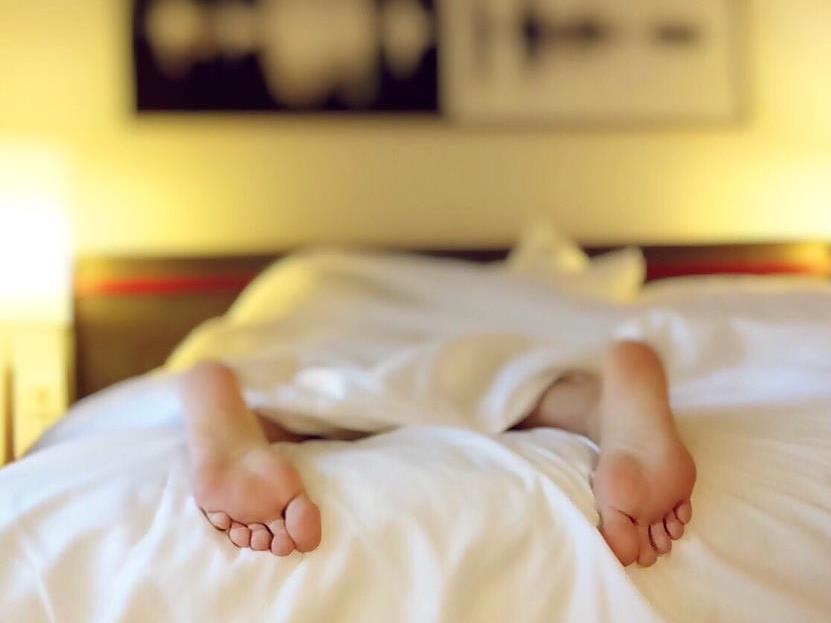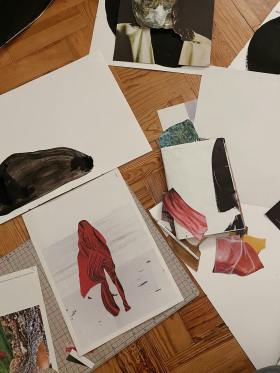Uncertainty is a major stressor and the freelancer’s life is defined by uncertainty. ‘Your potential as a freelancer to be stressed out is infinite,’ said freelance writer Neha Kale.
Managing often instable finances, clients, fluctuating workloads, marketing and pitching, as well as doing the work itself means that freelancers are particularly susceptible to burnout.
It’s a lot to ask of one person, said freelance consultant Rachel Service. ‘Freelancing can often see you working in isolation, leaving you to your own mental state to be able to create healthy boundaries about how often you work, when you work, how you manage tricky clients and invoicing.’
Unstructured work hours can also unravel many freelancers. ‘I would go so far as to say that freelancers face the perfect recipe when it comes to burnout, although its a condition we know does not discriminate, and effects all levels and individuals in a variety of work environments,’ she added.
Previously ArtsHub has covered why we are burning out in the arts, but recognising the industry is made up largely of freelancers, contractors and independent artists, it’s important to address the particular stresses related to working independently and revisit anti-burnout strategies.
How to identify if you are burning out
Service has personal experience of how badly burnout can affect freelancers.
‘In my most severe experiences, I have passed out before work, been unable to stand, eat, been diagnosed with anxiety and depression and unable to eat, work, exercise or get out of bed for months.’
At worst burnout can feel like ‘a deep depression you can’t shake, you can’t get out of bed, and your body shuts down,’ she said.
But Service, who now runs anti-burnout workshops through her business Happiness Concierge, said you don’t have to be at that stage to be suffering from burnout. It can present as feeling tired, demotivated, uninspired, bored, cynical and a ‘pain in the ass to be around’.
Freelance writer Kate Iselin’s experience mirrors that description as she admits to sleeping for ten hours but waking up feeling exhausted.
‘I lost interest in my work, not because I didn’t have the passion for it but because I didn’t have the energy I needed to properly invest myself in it. I was constantly tired, worn out, and became really neglectful of things like deadlines and appointments.’
‘Being a freelancer means you’re often pulled in a dozen different directions at once and because you might be working alone, it’s harder to find someone to confide in if you’re finding it difficult,’ said Iselin.
But how can you tell if you are burning out or just pushing new boundaries in your career?
For freelance producer Bryce Ives, it’s important to distinguish between the two different types of burnout.
There is the ‘healthy’ form of burnout where you are challenging yourself and stepping outside your comfort zone, he said. The key indicator here is that you are making the active choice to work extremely hard for a short period of time.
Conversely, there is the ‘unhealthy’ burnout where you are working to an extremity every day of the week and ‘alarm bells should go off,’ said
To get the balance right, Ives likens work stress to being a “sometimes food” in a healthy diet.
‘You want to make work that goes into the depths of extremity and that means producers and artists need to be willing to do that themselves, but it is not something that should always be happening, it’s a sometimes activity.’
The financial stress of freelancing
A common contributor to burnout for freelancers is the stress that comes with an unstable income – the swing from no work, to suddenly dozens of deadlines.
‘You panic thinking, “How am I going to pay my rent next month?” so you say yes to that teaching gig, yes to running that class and yes to being in that dance work and before you know it you are doing 20 things and feeling burned out,’ said Ives.
Such stress can amplify when you are feeling unwell. ‘If you’re working by yourself or for yourself, chances are you don’t have the opportunity to take a sick day or mental health day and still get paid,’ said Iselin.
‘So even when you’re feeling like garbage you have to keep on working at your peak; and often that makes you feel worse again. It’s a vicious cycle.’
Saving can be a helpful anti-burnout strategy. ‘I’m notoriously irresponsible with my money, but what I have started doing recently is trying to put away at least $50 a week in to my savings so I can take days or weeks off when I need to. It’s not a lot, but I know if there comes a time when I just need two weeks off, I’ll hopefully have enough in the kitty to get by,’ said Iselin.
You’re allowed to stop working
When first starting out as a freelance writer, Neha Kale didn’t set any boundaries and would work an average of sixty hours per week.
‘I hit a point where I was really tired and friends and family were saying to me that I was working all the time and something just shifted,’ she said.
But as Kale points out, as a freelancer you can work around the clock if you don’t pay attention. This is where boundaries are important.
‘I feel like a lot of artists and writers romanticise this idea of working all the time and it’s not necessary. It’s important to take time off and do nothing without feeling guilty about that.
‘As a writer you need your energy because it feeds into your work, your creativity energy is totally dependent on your physical energy,’ she said.
Kale has now learnt the importance of stopping and taking a break. ‘People think that by not taking weekends off it makes you a better creative, but it actually makes you a worse. Without having a break you have nothing to put into your writing and you are just churning.’
Service agrees with setting boundaries, as ‘no client will ever ask you to stop working.’
‘It’s a very specific set of skills freelancers need to refine to avoid burnout and that’s entirely around boundaries. It comes down to valuing yourself and your health more than any job. For freelancers, when time is money, this is a big hurdle to get their head around,’ said Service.
What the hurdle represents is a fundamental anti-burnout strategy that sees a shift from the “busy trap” and overworking to prioritising your health.
‘Ultimately overworking stems from fear,’ Service told ArtsHub. ‘Fear of not doing a good job. Fear our client doesn’t respect us or our work. Fear we have no idea what we are doing. Fear we’re not delivering. Combine that with a culture which rewards business over effectiveness and you’ve got a recipe for disaster.’
The ultimate anti-burnout strategy is learning how to say no. ‘Saying no to clients while retaining them for other work is a fine line. The inability to value and articulate your boundaries and what you will and won’t do is ultimately what leads to burnout,’ said Service.
The pressure to keep working can also stem from a culture of competitiveness, explained Iselin. ‘I find writing can be hugely competitive, not necessarily in a malicious way, but when you see your friends landing big gigs and getting huge bylines, it’s hard to fight the little voice in your head that says you should be achieving on that level too.’
Overcoming comparison can be a helpful anti-burnout strategy. ‘I try to set objectives and goals for myself at the start of each year and again at each month, and remind myself that these are the things that matter to me: it’s okay if they change, but it’s also okay if I’m not necessarily winning a certain award or writing for a particular magazine, because I have other goals that are specific to my career and my life.’
Anti-burnout tips for everyone
All freelancers stressed the importance of taking care of yourself by doing work you enjoy, exercising regularly, eating well, resting, spending time in your home or in nature, limiting screen time, sleeping and maintaining decent relationships.
‘Studies have shown time and time again the most valuable thing people can have which contributes to their mental health is quality of relationships. These are not exclusive to romantic partners; good mates, buddies, people who make you laugh and ‘get’ you. That’s the recipe for looking after yourself,’ said Service.
Iselin agreed that relationships are key. ‘One thing that has really helped me is having friends who are in totally different industries to me. When I’m stressing about, say, how a piece has been edited or whether or not someone liked my pitch, it’s refreshing to have a mate on-hand who can bring you back down to earth and remind you that these events are really minor in the grand scheme of things.’
After all, simply talking about how you are feeling can help. ‘I mentioned how I was feeling in a Facebook post (and then later wrote an article about it) and it surprised me how many people contacted me and said that they felt the same way, either in the past or right now. Obviously I don’t want all my friends feeling burned out, but it was nice to know I wasn’t alone!’
For Ives, it helps to get some fresh air. ‘I think that always have a willingness to just get out of the city. If I am on the verge of burnout on intensive projects, just leaving the city for a day can make all the difference.’





